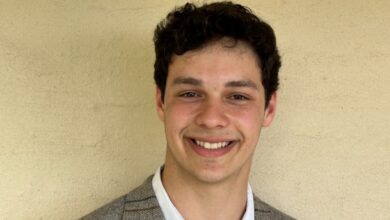Exploring the Research and Academic Journey of Saadbin Khan at Virginia Tech

Saadbin Khan is an accomplished Ph.D. candidate in Engineering Mechanics at Virginia Tech, where he delves into groundbreaking research in computational mechanics, fluid flow, and particle transport. His academic journey reflects his deep passion for the intricacies of engineering mechanics, particularly focusing on the role of hydrodynamic slip in insect respiration, a project funded by the National Science Foundation (NSF). This article provides a detailed insight into his research, education, and academic experiences at Virginia Tech and Oklahoma State University, shedding light on his contributions to the field of engineering and his professional aspirations.
Educational Background
Virginia Tech: Ph.D. in Engineering Mechanics
Saadbin Khan’s academic career at Virginia Tech began in 2021 when he embarked on his Ph.D. in Engineering Mechanics. His area of research centers around computational mechanics, a branch of engineering that uses mathematical models and simulations to analyze physical phenomena. The research project he is currently working on, funded by the NSF, explores the role of hydrodynamic slip in insect respiration. This project stands at the intersection of fluid dynamics and biology, where Saadbin applies high-performance computing methods to study how fluid flow behaves in tiny, complex biological systems like the tracheal networks of insects.
Saadbin’s work at the Laboratory for Fluid Dynamics in Nature (FINLAB), under the guidance of Dr. Anne Staples, demonstrates his ability to merge advanced computational methods with biological insights. The research investigates how the physical properties of fluids, such as viscosity and flow rates, impact the efficiency of respiration in insects. This work is crucial for understanding biological systems and can have broader implications in bioengineering, including the design of artificial respiratory systems and the study of biological fluid dynamics.
Oklahoma State University: Master’s in Mechanical & Aerospace Engineering
Before joining Virginia Tech, Saadbin Khan earned his Master’s in Mechanical and Aerospace Engineering from Oklahoma State University. During his time at Oklahoma State University, Saadbin worked as a Graduate Research Assistant in the Computational & Flow Science Research (CFSR) Laboratory. Under the mentorship of Dr. Balaji Jayaraman, Saadbin contributed significantly to understanding the near-wall structure of wavy channel turbulence through Direct Numerical Simulations (DNS).
At the CFSR Laboratory, Saadbin also worked on a project in collaboration with Baker Hughes General Electric (BHGE), where he developed code for an improved plume source inversion model. This model was designed for efficient remote leak detection in atmospheric dispersion applications, a project critical for environmental monitoring and safety. His contributions involved coding and modifying subroutines using Fortran, along with developing post-processing and analysis tools using Python.
Professional Experience and Contributions
Graduate Research Assistant at Virginia Tech
At Virginia Tech, Saadbin Khan has been working as a Graduate Research Assistant since May 2021, focusing on computational fluid mechanics and high-performance computing. His primary project involves investigating how hydrodynamic slip influences insect respiration. This research, supported by NSF funding, utilizes advanced simulations to explore fluid dynamics in microscopic biological systems.
The research is particularly significant because it explores a relatively uncharted area in biological fluid dynamics. By investigating how insect respiratory systems interact with the surrounding environment, Saadbin’s work could lead to new technologies in biomimicry, where engineers design systems inspired by nature’s mechanisms. His work in fluid dynamics can also be extended to fields like aerospace and automotive engineering, where the principles of fluid flow play a critical role in optimizing system performance.
Graduate Teaching Assistant at Virginia Tech
In addition to his research, Saadbin Khan served as a Graduate Teaching Assistant (TA) at Virginia Tech. He assisted in the Department of Biomedical Engineering & Mechanics, specifically in a sophomore-level Dynamics course with around 200 students. Saadbin’s duties as a TA included preparing homework assignments, quizzes, and exam questions, coordinating problem-solving classes, and helping students debug numerical methods and MATLAB codes. His experience as a TA enhanced his ability to communicate complex concepts in a simplified manner, a skill that will prove valuable in his future career as an educator and researcher.
Research Experience at Oklahoma State University
During his time at Oklahoma State University, Saadbin Khan’s research focused on computational simulations related to fluid dynamics. His work in the CFSR Laboratory involved performing Direct Numerical Simulations (DNS) to understand the structure of turbulence in wavy channels. DNS is a highly detailed and computationally expensive method used to study fluid flow at a microscopic level. Saadbin’s expertise in this area helped refine simulations that are crucial in understanding turbulent flows in various engineering systems.
He also contributed to the LUMEN project, a collaboration with BHGE aimed at improving leak detection in atmospheric dispersion. The project employed a plume source inversion model to detect gas leaks remotely, a critical technology for safety in the energy sector. Saadbin’s role in developing and optimizing this model showcased his ability to apply computational methods to solve real-world engineering problems.
Research Interests and Future Directions
Saadbin Khan’s research interests are deeply rooted in computational mechanics, with a focus on fluid dynamics, particle transport, and biological systems. The NSF-funded project on insect respiration is one of the many ways Saadbin is bridging the gap between engineering and biology. The insights gained from his research could lead to the development of more efficient artificial respiratory systems and other bio-inspired technologies.
In the future, Saadbin aims to expand his research into areas such as bioengineering, environmental monitoring, and fluid dynamics in biological systems. His work on hydrodynamic slip in insect respiration could also lead to new methodologies for understanding airflow in other biological systems, with implications for healthcare and environmental sciences.
Conclusion
Saadbin Khan’s academic and professional journey is a testament to his dedication and passion for computational mechanics and fluid dynamics. From his early education at Bangladesh University of Engineering and Technology to his research endeavors at Oklahoma State University and Virginia Tech, Saadbin has consistently pushed the boundaries of engineering knowledge. His work in bioengineering, particularly on the role of hydrodynamic slip in insect respiration, is pioneering, with the potential to impact various fields, including aerospace, environmental safety, and biomedical engineering.
As Saadbin continues his research at Virginia Tech, his contributions to the field of engineering mechanics and computational fluid dynamics will undoubtedly shape the future of bio-inspired technologies. His academic journey is a model for aspiring engineers and researchers who seek to make a meaningful impact through innovation and interdisciplinary research.
For More informative Blog Visit: Trend News Mark



